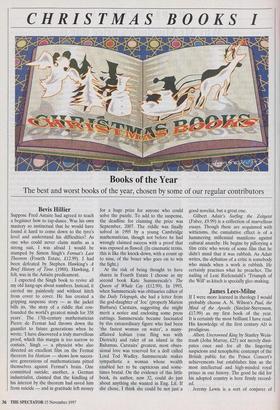CHRISTMAS BOOKS I
Books of the Year
The best and worst books of the year, chosen by some of our regular contributors
Bevis Hillier
Suppose Fred Astaire had agreed to teach a beginner how to tap-dance. Was his own mastery so instinctual that he would have found it hard to come down to the tyro's level and understand his difficulties? As one who could never claim maths as a strong suit, I was afraid I would be stumped by Simon Singh's Fermat's Last Theorem (Fourth Estate, £12.99). I had been defeated by Stephen Hawking's A Brief History of Time (1988). Hawking, I felt, was in the Astaire predicament.
I expected the Singh book to revive all my old hang-ups about numbers. Instead, it carried me painlessly and without hitch from cover to cover. He has created a gripping suspense story — as the jacket bills its, 'the story of a riddle that con- founded the world's greatest minds for 358 years'. The 17th-century mathematician Pierre de Fermat had thrown down the guantlet to future generations when he wrote: 'I have discovered a truly marvellous proof, which this margin is too narrow to contain.' Singh — a physicist who also directed an excellent film on the Fermat theorem for Horizon — shows how succes- sive generations of mathematicians pitted themselves against Fermat's brain. One committed suicide; another, a German industrialist, claimed that the kindling of his interest by the theorem had saved him from suicide — and in gratitude left money for a huge prize for anyone who could solve the puzzle. To add to the suspense, the deadline for claiming the prize was September, 2007. The riddle was finally solved in 1995 by a young Cambridge mathematician, though not before he had wrongly claimed success with a proof that was exposed as flawed. (In cinematic terms, this is like the knock-down, with a count up to nine, of the boxer who goes on to win the fight.) At the risk of being thought to have shares in Fourth Estate I choose as my second book Kate Summerscale's The Queen of Whale Cay (£12.99). In 1993, when Summerscale was obituaries editor of the Daily Telegraph, she had a letter from the god-daughter of 'Joe' (properly Marion Barbara) Carstairs, suggesting she might merit a notice and enclosing some press cuttings. Summerscale became fascinated by this extraordinary figure who had been `the fastest woman on water', a many- affaired lesbian (one fling was with Dietrich) and ruler of an island in the Bahamas. Carstairs' greatest, most obses- sional love was reserved for a doll called Lord Tod Wadley. Summerscale makes sympathetic a woman whose wealth enabled her to be capricious and some- times brutal. On the evidence of this little book, its author, now 32, could do just about anything she wanted in Eng. Lit. If she chose, I think she could be not just a good novelist, but a great one.
Gilbert Adair's Surfing the Zeitgeist (Faber, £9.99) is a collection of marvellous essays. Though these are sequinned with witticisms, the cumulative effect is of a hammering millennial manifesto against cultural anarchy. He begins by pillorying a film critic who wrote of some film that he didn't mind that it was rubbish. As Adair writes, the definition of a critic is somebody who minds when a work is rubbish. He certainly practises what he preaches. The nailing of Leni Riefenstahl's 'Triumph of the Will' as kitsch is specially glee-making.










































































 Previous page
Previous page